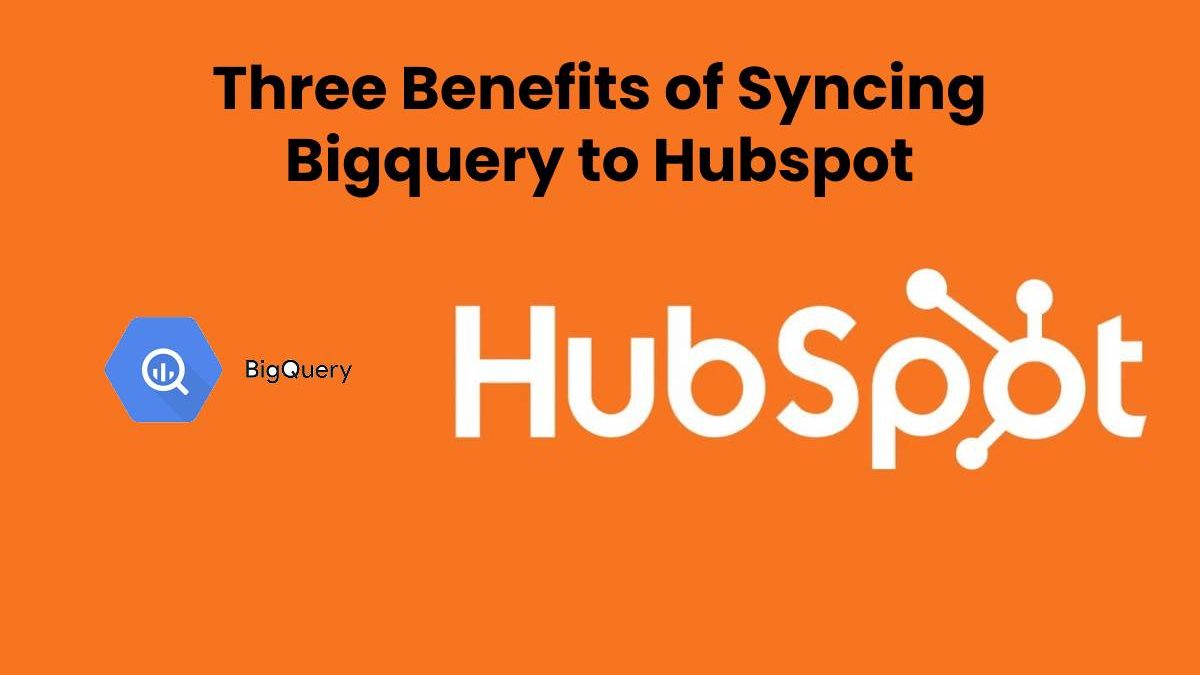Three Benefits of Syncing Bigquery to Hubspot
Any discussion of syncing BigQuery to Hubspot, or any business intelligence technology to another for that matter, must begin with use cases, and a discussion of use cases cannot begin unless one has a fundamental understanding of what BigQuery is and a fundamental understanding of what HubSpot is.
What Is BigQuery?
BigQuery is an expansive data warehouse that connects users with unparalleled data management as well as meaningful and comprehensive data analysis. With BigQuery, take advantage of other services like machine learning, demographic analysis, location-based analysis, or something as simple as general business intelligence. Since BigQuery’s architecture exists entirely outside servers, you can query against any data warehouse with SQL and draw conclusions that answer your business’s most immediate concerns and profits in minutes. Meanwhile, you need not invest any effort in maintaining the infrastructure of your pre-existing technologies.
Also, BigQuery offers immense flexibility by separating computation and number-crunching from ultimate storage of any data you find useful. You can perform both activities within BigQuery, or use BigQuery exclusively to evaluate the living quarters of your data. BigQuery allows you to enter queries against external sources while running updates to any of your warehouses. BigQuery’s powerful interface-wide tools allow for you to analyze if not understand the conclusions your data might suggest.
With BigQuery’s simplest command line (or terminal) tools, data scientists and software developers can integrate any major library with whatever programming language or framework is most familiar. In software development, most professionals find it most prudent to specialize in one thing than to try to be a jack of all trades. If you are a jack of all trades in programming, then that you are a master of none is ultimately more important, outbalancing any advantages working within many languages might offer. BigQuery allows you to stay inside your comfort zone without overstaying your welcome. From languages as accessible as Python and JavaScript to those as obscure as Go and Ruby, BigQuery allows for any library to be accessed by any language.
Whether you are a business owner, a data analyst, or a software engineer, BigQuery and its documentation can help your business discover opportunities, implement meaningful change, maintain favored data tools, and thrive by informing the most critical decisions your executive teams must make.
What Is HubSpot?
HubSpot is a CRM platform with which to manage marketing, customer service, and sales needs. Within the HubSpot platform, there are many products that offer specific services, though it is recommended that you use as many as possible in tandem.
For example, HubSpot’s Marketing module allows for you to grow more traffic among customers in and out of your site, convert a lot more unwary visitors, and run more potent marketing campaigns that generate more immediate and noticeable results.
To address the other modules, the Sales module can allow for deeper insights into prospects. It can tell you which potential clients are worth pursuing and which are worth avoiding. Meanwhile, it automates the most menial tasks that have nothing to do with building relationships, allowing you to close deals faster and move onto other great prospects before they abandon your business for another.
Next, the Service module allows for better communication with ongoing customers, helping you hang onto lucrative leads for more time. Exceed customers’ expectations so much as to turn them into evangelists for your business. A good review can be as helpful as a bad review can be detrimental.
Why Sync?
Now that we have outlined the purpose of a potent CRM as well as the differences between BigQuery and Hubspot, we can discuss the importance of introducing the two to each other. The bottom line is that syncing BigQuery with HubSpot is the easiest way to empower communication across all departments, especially communication between marketing and sales departments.
These two types of teams should have access to all the context that makes data valuable. These teams should have the most tools in order to bring about better and faster decision-making, and this sync will offer complete access and visibility into any customer’s entire journey.
For most businesses, virtually all interactions between customers and businesses can be captured by HubSpot. The only problem with HubSpot is that it offers a fairly one-dimensional view of customers, whereas BigQuery offers a more complex view of customers’ needs. To offer genuinely personalized experiences to all customers, the two CRMs need to be combined via syncing.
Ultimately, going about this sync does not even require a real script or an API call. You can achieve everything you need to achieve with a query language, so you need not waste time on the difficult task of building scripts. Syncing BigQuery to HubSpot is the best way to make critical business decisions that elevate profits nearly tenfold.

